|
|
|
Sort Order |
|
|
|
Items / Page
|
|
|
|
|
|
|
| Srl | Item |
| 1 |
ID:
162698
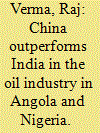

|
|
|
|
|
| Summary/Abstract |
The article asserts that China’s NOCs have trumped Indian oil companies in four ways. First, Chinese NOCs have more oil blocks in Angola and Nigeria relative to Indian oil companies. Second, NOCs from China are able to outbid Indian oil companies if and when they directly compete for the same oil blocks. Third, Chinese NOCs have better quality oil blocks compared to Indian oil companies. Fourth, Chinese NOCs are preferred as partners by African NOCs and international oil companies. It provides a more comprehensive explanation of the above observations by examining macro level factors such as difference in the economic, political and diplomatic support received by the Chinese and Indian oil companies from their respective governments and foreign exchange reserves and micro level factors such as access to capital, rate of return on investment, pricing of oil and risk aversion.
|
|
|
|
|
|
|
|
|
|
|
|
|
|
|
|
| 2 |
ID:
173221
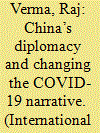

|
|
|
|
|
| Summary/Abstract |
The world has declared COVID-19 (a disease caused by the SARS-CoV-2 virus or novel coronavirus) to be a pandemic. China has been chastised by various countries, especially the United States, for suppressing information and not taking necessary measures which could have helped in controlling the spread of and/or eradicating the disease in the earlier stages. Consequently, China has undertaken numerous measures to change the COVID-19 narrative and disassociate itself from COVID-19. It launched a campaign to question the origins of SARS-CoV-2, blamed the United States for spreading COVID-19, claimed victory in combating COVID-19 domestically, and provided aid (“mask diplomacy”) to countries. These actions betray China’s concern about its image. The country wants to portray itself as a Good Samaritan, a responsible and reliable partner, and an essential global power. Additionally, China has grave concerns about regime stability and survival. President Xi’s legitimacy is built on technocratic competence. The outbreak has the potential to seriously dent his personal legacy.
|
|
|
|
|
|
|
|
|
|
|
|
|
|
|
|
| 3 |
ID:
175064
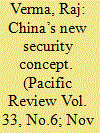

|
|
|
|
|
| Summary/Abstract |
The paper seeks to provide an answer to the question which has hitherto not been significantly explored in the relevant academic scholarship: Why did China block India’s (and other countries) attempts to designate Masood Azhar – head of Jaish-e-Mohammad (JeM/Jaish) as terrorist under UN Security Council 1267 committee rules? According to the extant literature, China's actions are explained broadly by India-China rivalry and India-Pakistan rivalry resulting in a strategic and ‘all weather partnership between China and Pakistan against their common enemy India. This study argues that China’s actions are also explained by its New (Asian) Security Concept and the ensuing China Pakistan Economic Corridor (CPEC), domestic (in)stability in Pakistan and China’s geo-strategic interests. China is deeply perturbed by the socio-economic-political instability in Pakistan. China was concerned that if Masood Azhar was designated as a terrorist under UNSC 1267 Committee rules, Jaish and other terrorist organizations would take up arms against the Pakistani state (as in the past) which will create further instability in Pakistan and undermine CPEC and China’s geo-strategic interests. Thus, the paper provides a more comprehensive and nuanced grasp of China’s reluctance to designate Masood Azhar as a terrorist.
|
|
|
|
|
|
|
|
|
|
|
|
|
|
|
|
| 4 |
ID:
174438


|
|
|
| 5 |
ID:
188679
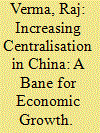

|
|
|
|
|
| Summary/Abstract |
This article contends that increasing centralisation of decision-making in China will undermine the country’s future economic growth. It highlights the declining role of private enterprises and the increasing role of state-owned enterprises (SOEs) in the economy, and the extension of Communist Party influence in both SOEs and the private sector through the Party’s Organization Department and United Front Work Department. It argues that the increasing role of the state in the economy over the past decade has stifled growth through a decline in ‘total factor productivity’ because of increasing misallocation of resources. Centralisation, with associated losses in efficiency, objectivity, agility, speed and finesse regarding allocations of risks and investment, has debilitated decentralised decision-making and reduced the incentives for undertaking risks and innovation. The article argues that increasing Party control over the SOEs and the private sector will negatively impact the corporate structure and management decisions, exacerbate the fundamental problems of corporate governance and limit or hamper innovation.
|
|
|
|
|
|
|
|
|
|
|
|
|
|
|
|
| 6 |
ID:
189440
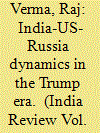

|
|
|
|
|
| Summary/Abstract |
Out of more than thirty strategic partnerships signed by India, its ties with the US and Russia are crucial for achieving economic and strategic objectives in the Indo-Pacific and the Eurasian region respectively. There was a growing convergence on bilateral, regional, and global issues with the US during Trump years, but there was divergence between the two countries on Russia. While Washington perceived Russia as a competitor and interfering in the domestic affairs of the US, Moscow on the other hand perceived the US as attempting to not only expand its influence in Russia’s backyard but also undermining Russia’s leadership and its political system. The relationship was also adversarial because the Sino-American escalation coincided with an increasing Russia-China bonhomie. Russia remained a valuable partner for India and India hoped for improved US-Russia ties under Trump. However, adversarial US-Russia ties cast a dark shadow on India-Russia ties. The US complained and was even contemplating sanctions on India for its purchase of S400 air defense systems from Russia. India’s reliance on Russian defence equipment and its policy of multi-alignment further increased tensions between India and the US although India-US strategic alignment has increased under Trump.
|
|
|
|
|
|
|
|
|
|
|
|
|
|
|
|
| 7 |
ID:
175650


|
|
|
|
|
| Summary/Abstract |
After more than 12 rounds of negotiations, at the 35th Association of Southeast Asian Nations (ASEAN) Summit and the third Regional Comprehensive Economic Partnership (RCEP) Summit held jointly in Bangkok, Thailand on 4 November 2019, India declared that it had decided to exit the RCEP. The RCEP is a proposed trade agreement between ASEAN and China, Japan, South Korea, Australia and New Zealand. The five countries have a free trade agreement (FTA) with ASEAN. The RCEP intends to increase trade and commerce by providing greater market access for countries that do not have FTAs with the bloc countries, providing investment opportunities for the bloc countries, reducing tariffs and other barriers and standardising customs rules and procedures. It will also help in setting up supply chains in the RCEP countries to export goods outside the bloc which will further enhance economic growth. The RCEP is the largest trading bloc in the world, larger than the European Union (EU) and the region covered by the US–Mexico–Canada trade agreement. It accounts for approximately one-third of the world’s population and one-third of the global gross domestic product (GDP).
|
|
|
|
|
|
|
|
|
|
|
|
|
|
|
|
| 8 |
ID:
189439
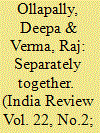

|
|
|
|
|
| Summary/Abstract |
This article highlights the convergence and divergence between India and the US pertaining to China under the Trump administration. Given Trump’s forceful personality and apparent chemistry with Modi, it is tempting to attribute bilateral relations to individual leaders. However, systemic pressures due to shared concerns over China’s rise and aggressive behavior played a significant role in keeping relations on track and ultimately deepening them. This led to increasing Indo-US cooperation in the Quad especially after the Galwan Valley cash in June 2020 although India initially feared entrapment. While there was convergence on the broad contours of the threat of a Sino-centric Asia, coming to agreement on specific strategies to prevent it faced its share of challenges with Trump wanting New Delhi to do more to counter China and do it faster. There was also divergence related to India’s continuing attachment to strategic autonomy underwritten by a multipolar world order, and Indian and American definitions of the boundaries of the Indo-Pacific and how the priority areas of each differed.
|
|
|
|
|
|
|
|
|
|
|
|
|
|
|
|
| 9 |
ID:
183362


|
|
|
|
|
| Summary/Abstract |
On 29 February 2020, the US and the Taliban signed a peace deal in Doha, Qatar. According to the peace agreement, the US agreed to withdraw 5400 troops from Afghanistan in 135 days reducing its troop strength to 8600. The US and North Atlantic Treaty Organization (NATO) also agreed to withdraw all troops from the country by 30 April 2021. The Taliban on its part agreed that it would prevent Al-Qaeda and other terrorist organizations from planning, organizing and operating attacks against the US and its allies in areas under its control. The Taliban also pledged to participate in an intra-Afghan dialogue to be held on 10 March 2020 in Oslo, Norway. As a confidence building measure, the agreement included a prisoner exchange with 1000 Afghan security personnel to be set free in exchange for 5000 Taliban prisoners by the time the dialogue will take place. The withdrawal of troops, however, is not contingent on the prisoner exchange.
|
|
|
|
|
|
|
|
|
|
|
|
|
|
|
|
|
|
|
|
|